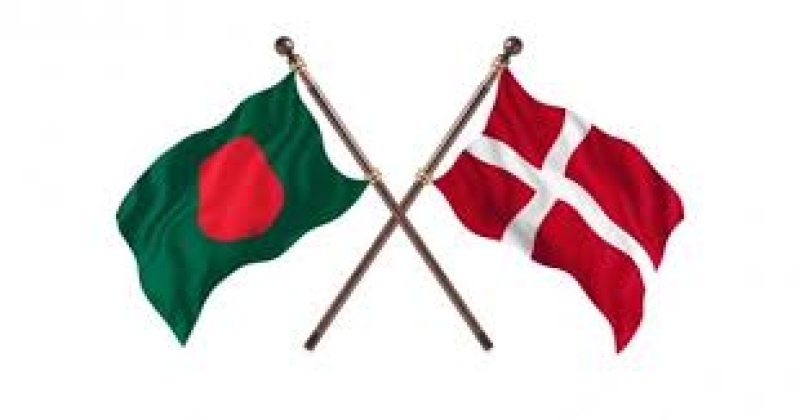- Khaleda now not fit for travelling: Medical Board |
- Panchagarh records lowest temperature 10.5°C so far this year |
- Christmas returns to Bethlehem after two years of Gaza war |
- কলাপাড়া মুক্ত দিবসে এবার সাড়া নেই কার |
- One killed, two injured in attack at Ctg meeting over marriage |
Denmark supports rights, media freedom in Bangladesh

Denmark has launched a new partnership to strengthen human rights, trauma-informed mental health and media freedom in Bangladesh.
The interim government, led by Nobel laureate Prof Muhammad Yunus, has called on civil society and state institutions to strengthen the country’s capacity in human rights and help build a more inclusive future.
In response, the Embassy of Denmark in Bangladesh has announced its support of DKK 25 million to a consortium consisting of DIGNITY, IMS, and the Danish Institute for Human Rights.
The consortium will partner with local actors to advance human rights, free independent media and access to rehabilitation for survivors of violence and torture.
“Right now, there is a unique opportunity to strengthen civil society in Bangladesh and address important challenges of human rights violations and impunity”, said Christian Brix Møller, Danish Ambassador to Bangladesh on Monday.
“We strongly believe that the upcoming program will contribute to revitalizing the pursuit of justice and democratic reform for the people of Bangladesh, as the three consortium partners have the relevant expertise to support civil society in promoting human rights and democracy,” the Ambassador said.
Each of the three organisations in the consortium has extensive experience of working in countries marked by both repressive regimes and democratic transition processes where support for civil society is essential.
“A strong civil society is crucial in advancing human rights and securing accountability and rehabilitation for survivors of torture and violence. In DIGNITY we look very much forward to supporting local partners with capacity building and help them deliver survivor-centered approaches and strengthen referral systems for the benefit of the survivors”, said Rasmus Grue Christensen, CEO of DIGNITY.
Executive Director at IMS, Jesper Højberg agrees with Rasmus Grue Christensen about the importance of a strong civil society: “At IMS, we know that meaningful change is only possible through genuine partnership. By working closely with local organisations, civil society and government, we aim to strengthen the foundations of Bangladesh’s media sector. Our shared goal is to ensure that every person in Bangladesh has access to trustworthy, independent information. Together, we can build a media environment where diverse voices are heard, journalists are protected, and the public’s right to reliable news is upheld—laying the groundwork for a more open and resilient society”.
The Danish Institute for Human Rights will have a particular focus on supporting the reform of the country’s National Human Rights Institution, Bangladesh’s National Human Rights Commission.
“We see a unique opportunity to support both institutional reform and civic engagement in Bangladesh. Reforming the National Human Rights Commission is key, and to be effective, our engagement will also build bridges and work with civil society and youth to articulate human rights demands and shape the country’s future. Our role is to help connect these actors and support a coherent, inclusive transition”, says Mette Thygesen, International Director at the
Danish Institute for Human Rights
DIGNITY will work to strengthen the capacity of local civil society to provide trauma-informed mental health and psychosocial support to survivors of torture and violence as well as address the lack of access to justice for survivors.
The organization will support the local capacity by providing training and mentoring to equip local partners to deliver services, applying survivor-centered approaches, while contributing to strengthening the systemic access to services in collaboration with state actors and private and public providers e.g. through the development of a stronger referral system to expand survivors’ access to rehabilitation and legal services.
IMS (International Media Support) aims to foster a pluralistic, inclusive, and resilient media environment during the country’s fragile political transition. Its core objectives in Bangladesh include supporting inclusive media reform, establishing national safety mechanisms for journalists, and strengthening emerging independent media through funding, capacity building, and strategic partnerships.
IMS’ Bangladesh program will operate through three complementary tracks and engage stakeholders across civil society, government and the media sector.
The Danish Institute for Human Rights will build on its experience in peer support for National Human Rights Institutions and convening and collaborating with a broad range of human rights actors.
The Danish Institute for Human Rights will support the reform of Bangladesh’s National Human Rights Commission, into a strong and independent national human rights institution that can act as a watchdog, an ally of human rights defenders, and as an adviser to the future government of Bangladesh, and collaborate with civil society organizations, human rights defenders, academic and public authorities to embed human rights in the ongoing reforms, reports UNB.

